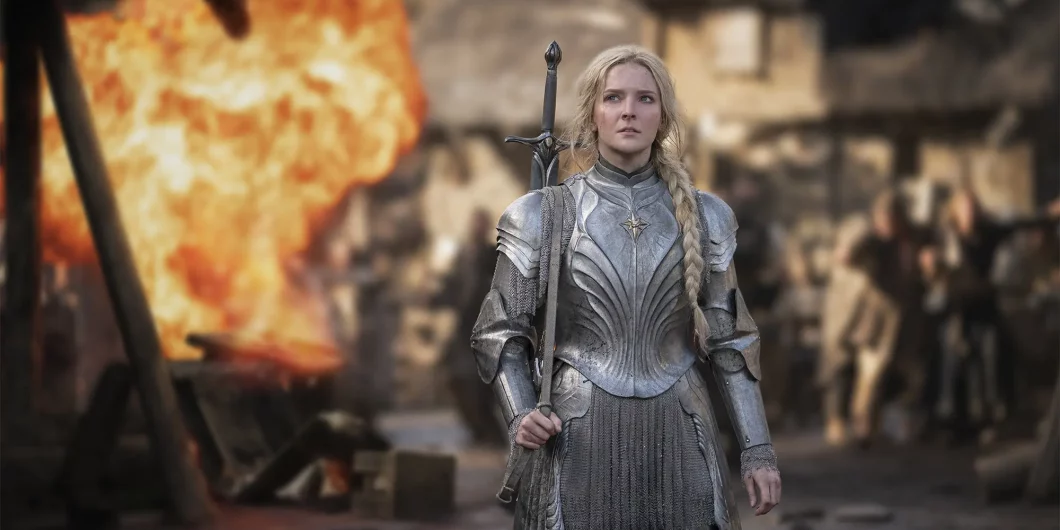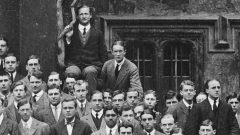The Rings of Progress
Last year, I wrote for Law & Liberty about Peter Jackson’s Lord of the Rings trilogy and what it has in common with Tolkien’s political intentions, partly in anticipation of the remarkable and unhappy filming of the new Amazon series, The Rings of Power, which has now released a first season. The Rings of Power is expected to cost a billion dollars, about a quarter of which secured the rights; it will not be remembered, nor will the other mediocre productions the media applauds these days, but it has a good chance to achieve something lasting: to destroy Tolkien’s influence on American children.
In the first place, we should simply accept that the series has nothing in common with Tolkien, except perhaps in the way of a parody. Tolkien may be the only very popular cultural force of an emphatically conservative character, and is therefore ripe for corruption. The assumption behind such an attempt is that the audience is really not interested in Tolkien and could easily be persuaded to watch a story in an entirely different spirit. If conservatives had wanted to prevent such a thing, they should have acted years back. They could have founded a film company and made good adaptations. If they care to do something now, let them speak up. But for my part, I guess that they are unable to act, indifferent, or irresponsible. They are victims whom it is very difficult to pity, since they did not learn from Tolkien how to fight, but only how to wish to escape their predicament.
Thus, with Amazon Tolkien becomes a new metaphor for Progress. The love between elves and humans becomes a metaphor for interracial marriage, for example, in the opening episode. The appearance of black hobbits and elves is merely another sign that the only thing we are to tell stories about is Progress as envisioned by a DEI committee. The opening episode’s focus on Galadriel—played as an angry, rebellious college girl—is also about Progress. Indeed, what else but this kind of Tolkien caricature can one expect in such circumstances?
Feminist Courage
At least since the 1950s, the individualism that threatens us with dissolution of our way of life and its many associations has taken the form of feminism. Feminism uses women to stand for the promise of authentic life, one free from the prejudices of the past, especially from masculine anger and violence. With The Rings of Power, that feminism now purports to be the major theme of Tolkien’s storytelling, which was until just now the most reactionary thing imaginable.
Thus, in the new series, a human female, a healer, does daring deeds and even kills an orc in defense of her child, then convinces her whole village they need to run to save their lives. The people she’s trying to save are presented as worthless—prejudiced, ignorant, grumbling, cowardly, and cruel. One of them turns out to be a terrible, but persuasive traitor.
Among the ancestors of the hobbits, too, a young female does yet more daring things against the narrow-minded race prejudices of her cowardly people, whom she of course constantly chastises, disobeys, and proves wrong. One expects her to say “she can’t even” every other scene, even though in her first exploit she endangers the lives of a number of gullible children. Even among dwarves, who are supposed to be, one wants to say, more solid, it is the wife of the prince who fixes his problems with his elf friend for him. She’d never even seen an elf, but the audience is expected to enjoy a woman putting men in their place.
Then, among the elves, we get a new version of Galadriel, the female around whom the whole plot implausibly revolves. There’s no reason to think she’s crucial to the story of the fall of the human kingdom of Numenor, Sauron’s creation of Mordor, or the Elven-Numenorean war on Sauron. Yet the audience must believe this implausibly young female—the characterization is teenaged, for a character supposedly thousands of years old—-is a great hero and the screenwriters’ ideology replaces any need for a story.
Evil
The first season is broadly about Galadriel’s quest to find and destroy Sauron; I am not sure she has any compelling motive, much less something to hang the plot on. The writers explain it thus: her older brother was dedicated to that quest, as part of the long war of the elves against the evil of Morgoth and his servants, including Sauron. That brother was killed by Sauron. He also had tried to soothe her anger when other elven children, out of jealousy of her ability to make a paper boat float on a stream, sunk it with stones and derided her; he had also taught her how to make paper boats and gave her moral advice.
It’s hard to say whether she just hates other elves or is largely indifferent to them because she’s on a journey of self-discovery which involves rejecting the ongoing elvish journey to the West. In just about every scene and every friendship, she displays anger and contempt—for the great Elrond, or even the king of the elves, Gil-galad. They are portrayed as politicians whose judgment is corrupted by their lack of her moral purity.
The Rings of Power is not merely a caricature of what kingship means in Tolkien’s storytelling, the noblest activity of men, but a preparatory refutation of it.
It’s worth dwelling on the attempt to make Progressive sense of Tolkien’s ideas. First, Tolkien believed that beauty and evil are somehow opposites. Secondly, relatedly, he held that creation must ultimately come out of beauty, presumably, because it wouldn’t otherwise be intelligible. We can restate this theoretically as saying that form has causal power. And thirdly, he saw that evil comes out of a kind of selfishness, an unwillingness to be part of that grand cosmic beauty and the divine command to create. A desire to take control of this or deny it to others seems to actuate Tolkien’s cosmic and political criminals.
One would think Progressives would thrill not only to Tolkien’s female characters but also his attempt to build friendship among races, to say nothing of his idea that beauty is somehow creative and helps us all belong together. The wicked Sauron or Morgoth before him would seem the very embodiment of the principle of discrimination! However, Tolkien sees too clearly that there must be an overarching authority in light of which creativity can add up to a cosmos, rather than chaos. Here our Progressives balk at this limit on individuality and instead create a Galadriel that really is more like Sauron than any of Tolkien’s beloved protagonists. In Tolkien’s terms, we should ask ourselves, would this character reject the One Ring?
Anger
Galadriel proves her individuality by opposing all other elves. Even her companions on her quest eventually get tired and disobey her, since they fear she might never stop. They suspect she wants to wage war on the universe itself for allowing there to be evil. This is undeveloped, as is every other psychological or moral question, so we must await another season. But if you allow me to voice an utterly unsurprising suspicion, it will eventually turn out that Galadriel is suffering from trauma and post-traumatic stress disorder and we must all be very understanding about it.
The anger of Galadriel is the principle of individuation in the story. Whoever resembles it is a protagonist. Whoever does not is a supporting character or a villain. My guess is that Galadriel will turn out to be the condition, if not the cause, of the rise of Sauron. Indeed, at the end of the first season, Mordor has been created and Mount Doom with it. I would further hazard the guess that she’ll be painted innocent as much as our storytelling can make someone.
There is a connection between the corruptible heroes or kingdoms of Tolkien’s writing and the nonsense in The Rings of Power, which could be called a depreciation of the intellectual virtues required to deal with the unpredictable. The story requires a kind of stupidity or absence of inquiry on the part of the audience, to say the least, which is rewarded with the moral conviction typical of children, as many of the protagonists indeed are young or portrayed as young. Since it is independent of experience, that power of conviction is not only unearned, but untrustworthy. It seems like the habit of watching TV and the prestige of Tolkien’s storytelling are necessary to turn blind self-importance into destiny.
The core decision in the story is Galadriel’s attempt to make the mysterious and suspicious Halbrand into king of the Southland. Her belief in him and their adventure together in Numenor and the Southlands, which become Mordor, however, is meaningless. It’s based on willful ignorance and yet drives the plot. The writers don’t want to tip their hand just yet and they also have to deceive viewers about their true intentions with Tolkien’s story. It is not merely a caricature of what kingship means in Tolkien’s storytelling, the noblest activity of men, but a preparatory refutation of it. People who end up in the habit of liking such stories will hardly ever be able to ask themselves what greatness of soul really is because they will forget such a thing exists.



